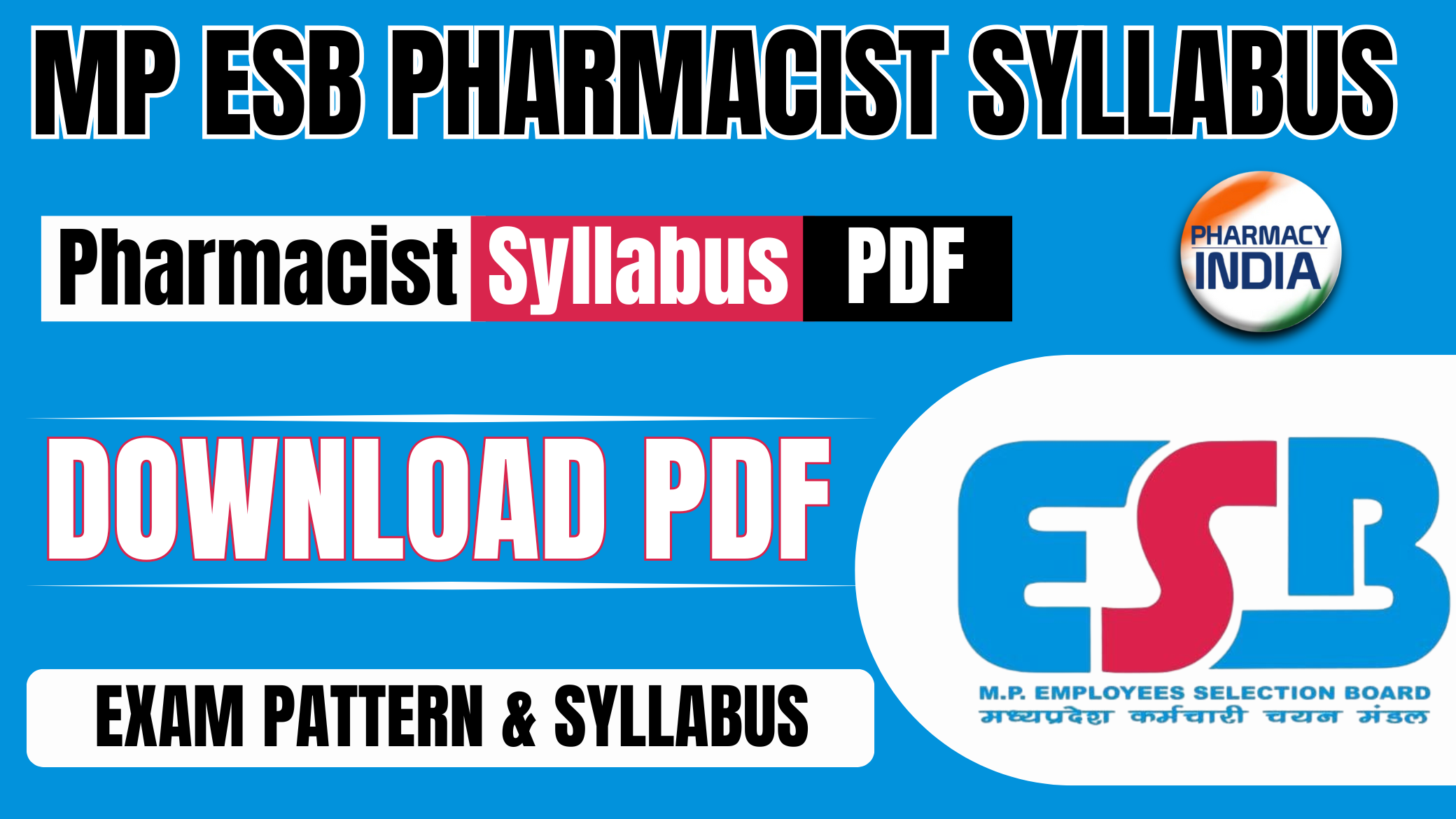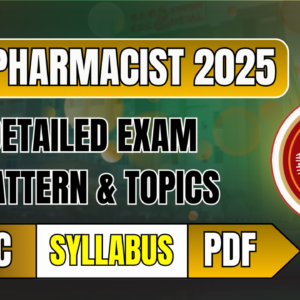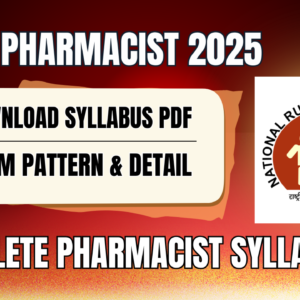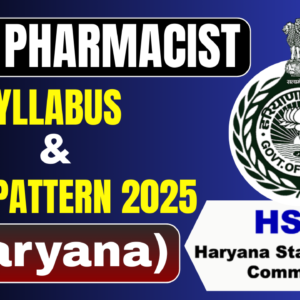WhatsApp D. Pharma Group
Join Now
Telegram D. Pharma Group
Join Now
Telegram Group Latest Pharma Jobs
Join Now
Telegram B. Pharma Group
Join Now
Telegram Medicine Update Group
Join Now
WhatsApp B. Pharma/ GPAT Channel
Join Now
MPESB Pharmacist Grade-2 Recruitment 2025
Complete Exam Pattern & Detailed Syllabus
MPESB Pharmacist Exam Pattern 2025
The Madhya Pradesh Employees Selection Board (MPESB) will conduct the Pharmacist recruitment exam in a single paper format. The paper is divided into two distinct parts: Part A (Non-Technical) and Part B (Technical – Pharmacy). Understanding this structure is key to planning your preparation effectively.
| MPESB Pharmacist Grade-2 Examination Scheme | |||
|---|---|---|---|
| Part | Section Name | No. of Questions | Marks |
| Part A | Non-Technical Section | 25 | 25 |
| Part B | Technical (Pharmacy) Section | 75 | 75 |
| Total | 100 Questions | 100 Marks | |
Detailed Syllabus for MPESB Pharmacist Exam
Part A: Non-Technical Section (Total 25 Marks)
This section assesses the candidate’s general awareness, language proficiency, and aptitude. The topics are standard for competitive exams in Madhya Pradesh.
1. General Knowledge (सामान्य ज्ञान)
- Current Affairs: Major national and international events, significant government schemes.
- Madhya Pradesh GK: History, geography, culture, tourism, economy, political scenario, major personalities, and welfare schemes of Madhya Pradesh.
- Indian History: Focus on major events in ancient, medieval, and modern Indian history, with special attention to the Indian freedom struggle.
- Indian & World Geography: Physical, social, and economic geography of India and the world.
- Indian Polity: Indian Constitution, Panchayati Raj, administrative structure, fundamental rights, and duties.
- Indian Economy: Basic economic concepts, Five Year Plans, and the current state of the Indian economy.
- General Science & Environment: Basic concepts of Physics, Chemistry, and Biology relevant to everyday life. Environmental ecology, biodiversity, and climate change.
- Awards, Honors, Books & Authors.
2. General Hindi (सामान्य हिन्दी)
- शब्द-रूपांतरण (लिंग, वचन, कारक)
- संधि एवं संधि-विच्छेद
- समास, उपसर्ग एवं प्रत्यय
- विलोम शब्द एवं पर्यायवाची शब्द
- मुहावरे एवं लोकोक्तियाँ
- वाक्यांश के लिए एक सार्थक शब्द, वाक्य-रचना एवं वाक्य-शुद्धि
- तत्सम एवं तद्भव शब्द
- अपठित गद्यांश पर आधारित प्रश्न
3. General English
- Vocabulary: Synonyms, Antonyms, One-Word Substitution, Idioms & Phrases.
- Grammar: Tenses, Articles, Prepositions, Verbs, Voice (Active/Passive), Narration (Direct/Indirect).
- Sentence Structure: Error Spotting, Sentence Correction, Sentence Improvement.
- Reading Comprehension: A passage followed by questions.
- Jumbled Sentences (Para jumbles).
4. General Mathematics (सामान्य गणित)
- Number System, Simplification and Approximation
- Percentage, Profit & Loss
- Simple and Compound Interest
- Ratio and Proportion, Average
- Time and Work, Time, Speed & Distance
- Mensuration (Area, Perimeter, Volume)
- Data Interpretation (Bar Graphs, Pie Charts, Tables)
5. General Aptitude / Reasoning (सामान्य अभिरूचि)
- Analogies, Classification
- Series (Number, Alphabet, Figure)
- Coding-Decoding, Blood Relations
- Direction Sense Test, Logical Venn Diagrams
- Syllogism, Problem Solving and Decision Making
Part B: Technical (Pharmacy) Section (Total 75 Marks)
This is the core section for pharmacy candidates, covering the entire spectrum of pharmaceutical sciences.
1. Pharmaceutics
- Introduction to Dosage Forms: Definitions, classification (Solid, Liquid, Semi-solid, Gaseous), advantages, disadvantages.
- New Drug Delivery Systems (NDDS): Concepts of sustained release, controlled release, targeted drug delivery, transdermal patches.
- Pharmacopoeias: History and significance of IP, BP, USP; Structure of a monograph.
- Unit Operations: Size Reduction (Hammer Mill, Ball Mill), Size Separation (Sieves), Mixing (Silverton mixer), Filtration (Membrane filter), Drying (Tray Dryer).
- Sterilization: Concepts and methods (Physical – Dry Heat, Moist Heat; Chemical – Ethylene Oxide; Mechanical – Filtration).
- Processing of Tablets & Capsules: Manufacturing steps, defects (capping, chipping), evaluation tests (hardness, friability), coating. Capsule manufacturing and evaluation.
- Immunological Products: Sera, Vaccines (live, attenuated), Toxoids, Concept of the cold chain.
2. Pharmaceutical Chemistry (Inorganic & Organic)
- Inorganic Chemistry: Acids, Bases, Buffers; Gastrointestinal Agents (Antacids); Major Electrolytes (ORS); Topical Agents (Antimicrobials); Quality Control (Limit tests for Chloride, Sulphate, Iron).
- Organic Chemistry: Nomenclature, structure, stability, and uses of key drug classes including Anesthetics, Sedatives, Hypnotics, Antipsychotics, Antidepressants, Analgesics (Narcotic & Non-narcotic), NSAIDs, Antihistamines, Antihypertensives, Diuretics, Antibiotics (Penicillins, Cephalosporins), and Antineoplastic agents.
3. Pharmacognosy
- Introduction: Definition, history, scope, and classification of crude drugs.
- Drug Evaluation & Adulteration: Organoleptic, microscopic, chemical, and biological evaluation methods.
- Plant Constituents: Tests for Alkaloids, Glycosides, Tannins, Volatile Oils.
- Pharmacological Study of Crude Drugs: Laxatives (Senna), Cardiotonics (Digitalis), Carminatives (Fennel), Astringents (Catechu), Drugs on CNS (Opium), Antihypertensives (Rauwolfia), Antitussives (Vasaka), Antidiabetics (Gymnema), Antimalarials (Cinchona).
- Surgical Fibres & Dressings: Source and preparation of Cotton, Silk, Wool.
4. Biochemistry & Clinical Pathology
- Introduction to Biochemistry: Macromolecules (Carbohydrates, Proteins, Lipids) and related diseases (Diabetes, Atherosclerosis).
- Vitamins, Minerals, and Water: Biochemical roles and deficiency diseases.
- Enzymes: Definition, classification, factors affecting activity.
- Clinical Pathology: Composition of Blood and Urine (normal and pathological values).
5. Human Anatomy and Physiology (HAP)
- Introduction: Structure of the cell, Tissues of the Body.
- Systems: Skeletal, Cardiovascular, Respiratory, Digestive, Nervous, Urinary, and Endocrine systems.
6. Health Education & Community Pharmacy
- Concepts of Health: Definitions, indicators of health, concept of disease.
- Disease Control: Epidemiology of communicable diseases (Tuberculosis, HIV/AIDS) and non-communicable diseases (Cancer, Diabetes).
- First Aid, Demography & Family Planning, Nutrition and Health.
- Immunization: National Immunization Schedule, concept of immunity.
7. Dispensing Pharmacy
- Prescriptions: Parts of a prescription, handling, and reading.
- Incompatibilities: Physical, chemical, and therapeutic.
- Posology: Dose calculation for adults and children.
- Dispensed Preparations: Liquid Orals, Biphasic Liquids (Suspensions, Emulsions, HLB scale), Semi-Solid, and Sterile Dosage Forms.
8. Pharmacology & Toxicology
- Introduction: Scope, routes of drug administration.
- Pharmacokinetics: ADME (Absorption, Distribution, Metabolism, and Excretion).
- Pharmacodynamics: Mechanism of drug action, receptors.
- Drug Classifications: Drugs acting on CNS, ANS, CVS, Respiratory System, Blood, Hormones, and Chemotherapy.
9. Pharmaceutical Jurisprudence
- Origin and Nature of Pharmaceutical Legislation in India.
- Key Acts and Rules:
- The Pharmacy Act, 1948: Objectives, PCI functions.
- The Drugs and Cosmetics Act, 1940 and Rules, 1945: Objectives, study of Schedules (G, H, X, M, P).
- The Drugs and Magic Remedies (Objectionable Advertisements) Act, 1954.
- The Narcotic Drugs and Psychotropic Substances Act, 1985.
- Pharmaceutical Ethics: A brief study of the Code of Pharmaceutical Ethics.
| Important Links | |
|---|---|
| Download Official Notification PDF | Click Here |
| Download Syllabus PDF | Click Here |
| Official Website | Visit Website |
MORE :Apply Now: ECHS Pharmacist Jobs 2025 | Government Pharma Vacancy for B.Pharm/D.Pharm
<<<<<<<<<<<<JOIN US>>>>>>>>>>>>>>>>
| Subscribe our PHARMACY INDIA YouTube Channel for more Pharma Updates | Click Here |
| Follow us on Instagram | Click Here |
| Download PHARMACY INDIA MOBILE APP from Google Play Store | Click Here |
| Follow us on LinkedIn | Click Here |
Health Paramedical Staff Recruitment Test SyllabusMadhya Pradesh Pharmacist SyllabusMP ESB Pharmacist SyllabusMP Govt Pharmacist Exam SyllabusMP Pharmacist Exam PatternMP Pharmacist Exam TopicsMP Pharmacist Recruitment SyllabusMP Vyapam Pharmacist SyllabusMPESB Paramedical SyllabusMPESB Pharmacist Exam 2025MPESB Pharmacist Grade 2 SyllabusMPESB Pharmacist Marks DistributionMPESB Pharmacist Non-Technical SyllabusMPESB Pharmacist Syllabus 2025MPESB Pharmacist Technical SyllabusPharmaceutical Jurisprudence MPESBPharmaceutics Syllabus MPESBPharmacist Exam Syllabus PDFPharmacist Syllabus MP 2025Pharmacology Syllabus for MP Pharmacist






